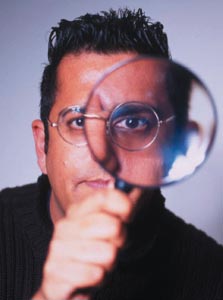Simon Singh is an author, journalist and TV producer specializing in science and mathematics

What are the three best popular-science books?
Just Six Numbers by Martin Rees. In such a competitive area of science writing as cosmology, the Astronomer Royal found a new angle and his explanations are clear and vivid.
E = mc2 by David Bodanis. This is a great book because it makes Einstein accessible to the general public. Some reviewers have criticized it as trivial, but in my opinion it reaches an audience that would not normally even pick up a science book.
Strange Beauty by George Johnson. A far more compelling account of Murray Gell-Mann’s life than his autobiography, this is an important book because Gell-Mann made such huge contributions to physics. As Feynman once said of the man, “The development during the last 20 years of our knowledge of fundamental physics contains not one fruitful idea that does not carry his name.”
What science books are you currently reading?
The Science of Harry Potter by Roger Highfield. This is a book aimed at adults, but the great thing is that it will be picked up by teenagers who will relish the fun ideas contained inside. It has a similar lightness of touch to Highfield’s previous book Can Reindeer Fly? As science editor at the Daily Telegraph, Highfield brings authority and breadth of knowledge to his writing.
What else are you reading?
I have just finished reading Freakonomics, one of the most controversial books of 2005. Economist Steven Levitt and journalist Stephen Dubner analyse various aspects of society with some surprising conclusions. The book’s subtitle says it all: A Rogue Economist Explores the Hidden Side of Everything.
Which popular-science book have you never read, but feel you ought to have tackled, and why?
I do not read enough natural history, although whenever I do delve into this area I am always fascinated. In particular, I should read more of Richard Dawkins’ work. So far I have only read Unweaving the Rainbow and The Selfish Gene, but I look forward to catching up with The Blind Watchmaker and The Ancestor’s Tale.
What advice do you have for physicists who want to write a popular-science book?
Apart from find an interesting story, with some fascinating science viewed from an original angle, my only advice would be to get a good literary agent. If it is the right person, he or she will support you, champion you, enthuse you, act as a sounding board and be a friendly critic.



